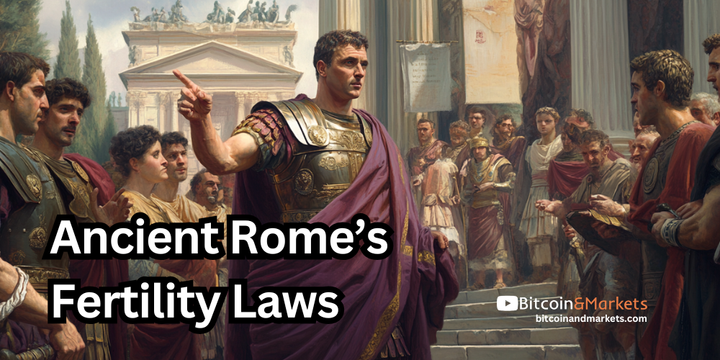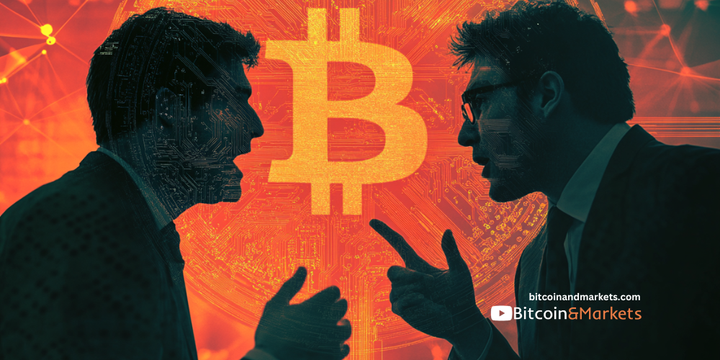Bitcoin Minute: Crypto Gaslighting In Congress
Examining SEC Chairman Gary Gensler's recent testimony in Congress and the dangers of promoting fraudulent crypto projects. A call for clarity and the importance of adhering to the Howey Test for securities.


I cannot provide this important Bitcoin and Macro analysis without you.
Bitcoin & Markets is enabled by readers like you!
Gary Gensler In Congress
Yesterday, SEC Chairman Gary Gensler testified in front of the House Financial Services Committee. It was a clown show–an opportunity for Representatives to get a sound bite chastising the Chairman. However, things are not as they are being portrayed by the crypto promoters on X.
Here is the full video.
I am a hardcore Bitcoiner and free-market advocate. I do not wish for the SEC to intervene in the market any more than I wish for non-government entities to commit massive fraud on the public.
That being said, the support for the "crypto industry" by members of Congress is badly misplaced. They are essentially promoting fraud, and I would strong recommend careful consideration of a bitcoin-only stance. I cannot stress this enough, the politicians grilling Gensler, not letting him answer a question, not really in search of information or the truth, are perhaps MORE dangerous than a rogue SEC Chairman.
Politicians are very susceptible to the deep pockets of the crypto scammers. FTX revealed that. They receive campaign contributions and a willing audience on X of victims of fraudulent crypto scams that will cheer on this kind of action in desperation.
"Crypto" is a space built on fraud. Only Bitcoin is legitimately a decentralized entity and not a security. It does what it promises and claims, that is all. Everything else claims affinity to bitcoin, needs bitcoin to legitimize the concepts as a whole, and they use false technical and financial claims to sucker investors.
The Howey Test Applied to Crypto
"Courts use the Howey Test to determine whether certain transactions qualify as investment contracts. If so, the Securities Act of 1933 and the Securities Exchange Act of 1934 apply to those transactions. Securities are subject to certain disclosure and registration requirements." - FindLaw.com
Notice the Howey Test is used by courts. It is a Supreme Court standard. The SEC is tasked with using the Howey Test. However, it is the "crypto" promoters who refuse to be subject to the test, attempting to gaslight and deceive the regulators in order to continue spinning their fraudulent schemes.
The test has four parts that must be all met for a transaction to be considered a securities transaction:
- It is an investment of money
- There is an expectation of profits from the investment
- The investment of money is in a common enterprise
- Any profit comes from the efforts of a promoter or third-party
All of them apply to "crypto" projects.
1) They are an investment of money.
2) An expectation of profit has been fostered by the founders, else how would anyone know about them to invest money into them?
3) These projects begin sales prior to launching the network, or prior to full implementation of a roadmap, meaning investors expect the team to continue work on the project and fix bugs if necessary.
4) If the team were not there to keep the fledgling network running and to work centrally on planned upgrades, the network would fail.
"Crypto" tokens meet all four criteria, yet promoters will claim Howey shouldn't apply to them. Why? Because of they would then have to comply with securities disclosure requirements. We'd see insiders, partners, business management, an audit, etc. They would essentially have to admit they are not decentralized, and therefore could no longer claim to be.
Why is that decentralization claim so critical? Because if you are not decentralized, there is no reason to use this technology—centralized architecture would be better. Investors wouldn’t be suckered into these dubious claims unless they were sold under the false narrative that this technology somehow makes these promises both exciting and profitable.
Where Does That Leave Us?
I will restate this very important point: Politicians promoting crypto scams, instead of bitcoin-only, is as dangerous to citizens as a rogue SEC Chairman. An analogy might be if politicians were promoting rigged casinos, and grilling the regulator who is trying to get the casinos to at least not cheat their players.
The crypto projects should simply comply with the Supreme Court's Howey Test and register as securities. Do not let them gaslight you into thinking a whole new standard is needed for them. That effectively concedes that they are subject under Howey, but don't want to admit it. This is completely different with Bitcoin, there is no one to comply.
I’m not calling for a ban on crypto—let them flourish—but the public deserves some enforceable honesty via securities disclosure.
Hope this helps someone.
Your support is crucial in helping us grow and spread my unique message. Please consider donating via Strike or Cash App or becoming a member today and get more critical insights!
Follow me on X @AnselLindner.
I cannot provide this important Bitcoin and Macro analysis without you.
Bitcoin & Markets is enabled by readers like you!
Hold strong and have a great day,
Ansel
- Were you forwarded this post? You can subscribe here.
- Please SHARE with others who might like it!
- Join our Telegram community
- Also available on Substack.
Disclaimer: The content of Bitcoin & Markets shall not be construed as tax, legal or financial advice. Do you own research.





